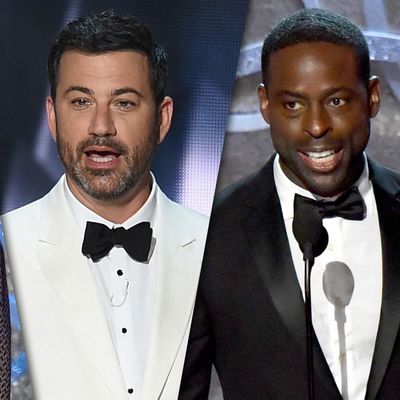
Awards shows are always walking a tricky line between celebrating the industry theyÔÇÖre feting and mocking it so everyone doesnÔÇÖt seem like wealthy, entitled monsters. Ideally, the presenters and winners come off as glamorous celebrities who are also human and down-to-earth and genuine.
I am as surprised as anyone, but Jimmy Kimmel did a strong job of walking that line as last nightÔÇÖs Emmy Awards host, deftly pivoting between congratulations and mockery. Perhaps most important, Kimmel managed to follow one of the most crucial rules of comedy in this circumstance ÔÇö he punched up. And by punching up, he sometimes had to punch at himself.
Oh, sure, there were the usual cheesy awards-show jokes. The Stranger Things kids biked through the audience passing out PB&J sandwiches allegedly made by KimmelÔÇÖs mother. This bit not only imitated EllenÔÇÖs Oscars pizza-delivery bit; it also added that fun ÔÇ£hey, moms do so much unrewarded work!ÔÇØ element. There was an eye-roll-worthy line about the outgoing chairman of the TV Academy taking one final chance to ogle Sofia Vergara. And there was a lengthy segment about KimmelÔÇÖs feud with Matt Damon, which only worked if you were already in on the joke.
But for much of the night, the show did an admirable job of creating a weird, unsettling sense of discomfort, oscillating between sincerity and pointed barbs. This was facilitated in part by what Kimmel noted from the jump was ÔÇ£the most diverseÔÇØ group of Emmy nominees ever, which begat a litany of winners who used their acceptance speeches to forward agendas of change. Jeffrey Tambor hoped that he might be the last cisgender man cast in a trans role, a plea later echoed by Laverne Cox. Sarah Paulson apologized to Marcia Clark for her sexist treatment by the media. In his acceptance speech for comedy writing (for the ÔÇ£ParentsÔÇØ episode of Master of None), Alan Yang noted that though there are roughly similar numbers of Italian- and Asian-Americans, Italians have┬áThe Godfather and The Sopranos, and Asians have ÔÇ£Long Duk Dong.ÔÇØ
The nightÔÇÖs most pointed moment came early, during Jill SolowayÔÇÖs acceptance speech after she won for directing TransparentÔÇÖs ÔÇ£Man on the LandÔÇØ episode. Soloway called for more casting of trans people, and thanked Amazon for promoting marginalized voices. Her speech ended with ÔÇ£Topple the patriarchy!ÔÇØ
Kimmel let that call bleed into his stewardship of the whole show. After SolowayÔÇÖs speech, he faux-uneasily wondered, ÔÇ£IÔÇÖm trying to figure out if ÔÇÿtopple the patriarchyÔÇÖ is a good thing for me or not ÔÇö I donÔÇÖt think it is.ÔÇØ
It was an early and telling piece of KimmelÔÇÖs whole stage persona, which seemed to suggest both a comfort in being the emcee, and an awareness of how odd it was for him to be the organizing face of an awards show that was doing its best to celebrate people who donÔÇÖt look like him. In fact, his best moments were when he leaned into the sense of unease ÔÇö over his role as emcee, over the current political climate, over fallen Hollywood idols, and over the EmmysÔÇÖ smug self-congratulations for its own diversity.
Kimmel blamed Mark Burnett, creator of Celebrity Apprentice, for the rise of Donald Trump. That bit concerned building a wall Kimmel proposed as a means to kick Burnett out ÔÇö of the country? Of the TV industry? Later, the orchestra piled on, swiftly playing off Burnett as he accepted the award for best reality competition show for The Voice. Kimmel mocked the continuing Hollywood disquiet over Bill Cosby, having the announcer introduce Cosby as a presenter before walking out himself. ÔÇ£HeÔÇÖs not really here, I just wanted to see what you guys would do,ÔÇØ he said as the room laughed nervously. And in his introduction to the Variety Comedy Series category, in which he himself was nominated, Kimmel pointed out that the eligible shows included ÔÇ£many wonderful programs, including six talk shows that are hosted exclusively by white men. This genre is the ironically titled ÔÇÿVariety!ÔÇÖÔÇØ
Not all of these were amazing, timeless jokes, and few were the sort of thing that breaks out into viral video-dom ÔÇö the nightÔÇÖs most viral moments were the moving acceptance speeches. But the total picture of the ceremony was nevertheless framed by this vague uneasiness, especially as it pertained to the systems of white privilege that are still so dominant in TV. It felt right, and like a relief, when both Jill Soloway and Susanne Bier won for directing Transparent and The Night Manager, both of them as the only women in their categories. It felt absolutely correct, and important, for both Sterling K. Brown and Courtney B. Vance to win for their roles in The People vs. O.J. Simpson.
And at the same time, it felt fitting for those moments to come in the same ceremony at which Kimmel told all the diverse nominees to take a moment and thank a white person for their bravery in being there that night. The message, for all its rueful chuckling awkwardness, walked a useful line. Celebrate the progress weÔÇÖve made, KimmelÔÇÖs performance frequently suggested. But donÔÇÖt forget how much there is left to do.


